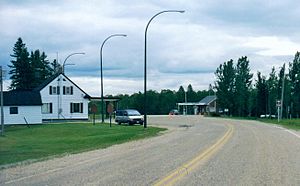Pinecreek–Piney Border Crossing
| Pinecreek–Piney Border Crossing | |
|---|---|
 Pinecreek–Piney Border Crossing as seen in 1998 | |
| Location | |
| Country | United States; Canada |
| Location |
|
| Coordinates | 49°00′00″N 95°58′41″W / 49°N 95.978172°W |
| Details | |
| Opened | 1922 |
| US Phone | (218) 463-1952 (9:00 AM-5:00 PM) |
| Can Phone | (204) 423-2153 (9:00 AM-10:00 PM) |
| Website US Canadian | |
The Pinecreek–Piney Border Crossing connects the communities of Pinecreek, Minnesota and Piney, Manitoba on the Canada–United States border. Minnesota State Highway 89 on the American side joins Manitoba Highway 89 on the Canadian side.
Canadian side
[edit]In 1922–23, a customs postal collecting station was established. In 1925, when a customs office assumed all customs activities, W.T. Holden was the inaugural customs officer. The Port of Winnipeg provided administrative oversight.[1]
The border station building was replaced in 1953.[citation needed] Around 1958, a new highway was built from Winnipeg to the crossing.[2]
In 2020, the former border hours of 9am–10pm reduced, becoming 9am–5pm.[3]
US side
[edit]The early border patrol history is unclear, but assumedly the US mirrored the establishment of a permanent post at least by the 1920s. In 1958, a brick border station and two staff residences were built.[2][4] The station building was replaced in 2012.[5]
The crossing is the least busy in Minnesota, with an average of fewer than 25 cars a day.[6]
Airport
[edit]Although operated by the Minnesota Department of Transportation, the adjacent Piney Pinecreek Border Airport's runway crosses the international border.[6] Access roads to the airport exist on both sides of the border. Small aircraft can land from either country, be inspected by officers from the other country and if admitted, continue to fly into the other country. Some pilots not crossing the border have reported unpleasant experiences at this airport.[7]
See also
[edit]References
[edit]- ^ Legg, Herbert (1962). Customs Services in Western Canada, 1867–1925. The Creston Review Ltd. p. 211.
- ^ a b Treasury-Post Office Appropriations, 1958 , p. 202, at Google Books
- ^ "Fact Sheet: COVID-19 – Additional temporary service reductions at select Canadian ports of entry". www.canada.ca. 3 Jul 2020.
- ^ "30-Day Review of Spending by U.S. Customs and Border Protection under the American Recovery and Reinvestment Act for Construction of Land Ports of Entry" (PDF). www.dhs.gov. 23 Oct 2009. p. 17.
- ^ "CBP Seattle Field Office Outstanding Year End Results". www.cbp.gov. 25 Feb 2013.
- ^ a b "Chapter 5: The 49th Parallel". United Divide: A Linear Portrait of the USA/Canada Border. The Center for Land Use Interpretation. Winter 2015.
- ^ Collins, Bob (August 31, 2016). "In Minnesota, an airport runway spans two countries". Minnesota Public Radio. Retrieved 22 December 2016.
